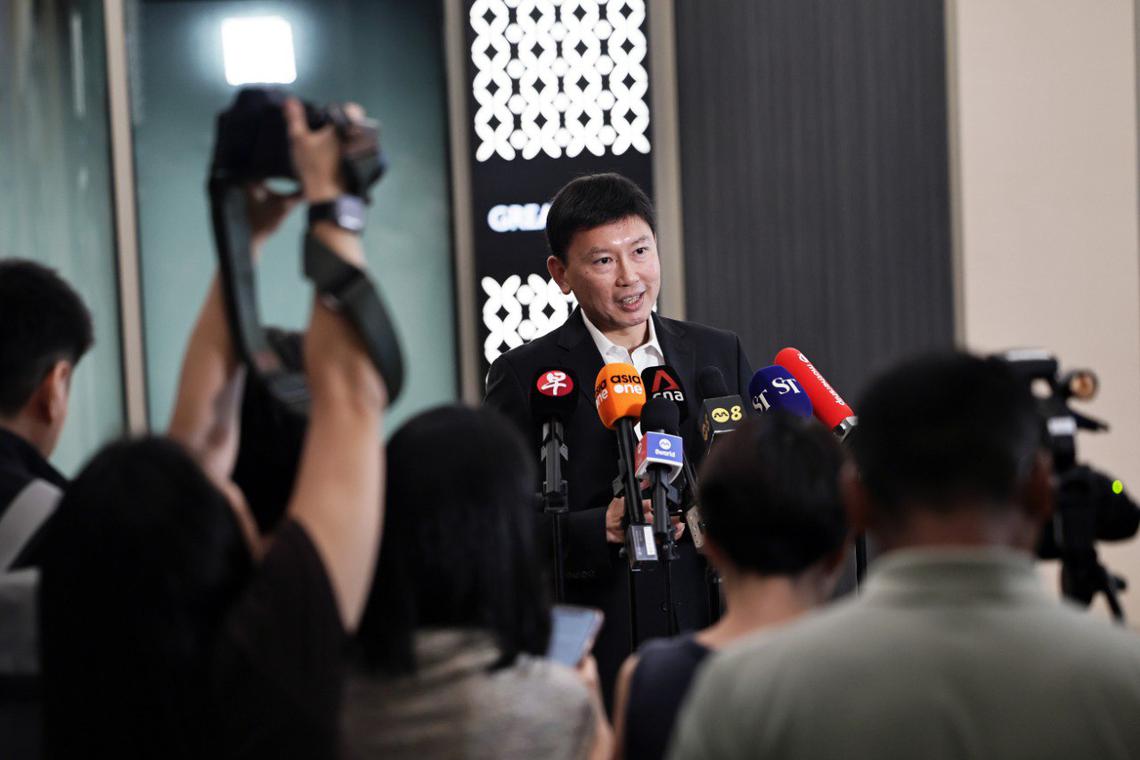SINGAPORE – Singapore must be willing to take some risks to capture new opportunities in the burgeoning wealth management sector.
This was the thrust of a doorstop interview given on July 9 by Mr Chee Hong Tat, deputy chairman of the Monetary Authority of Singapore (MAS).
He told the media after a visit to DBS Bank that Singapore must be willing to take some risks even as it strives to maintain high standards and be a convenient and trusted financial centre.
“When we talk about risk, we take a risk-proportionate approach and not zero-risk approach because if we are overly ‘kiasu’, I think we would not be able to capture new opportunities,” he said, using the local lingo that refers to a grasping attitude arising from a fear of missing out on something.
“So there is a need for us to strike a balance and go for high standards but a risk-proportionate approach, not a zero-risk approach.”
Mr Chee, who is also Minister for National Development, was speaking after his visit to DBS, where he met the bank’s chief investment officer for consumer banking and wealth management, Mr Hou Wey Fook, and several relationship managers.

Minister for National Development and MAS deputy chairman Chee Hong Tat (centre) meeting DBS senior executives and private bankers at DBS Bank on July 9.
ST PHOTO: KELVIN CHNG
He said the two goals of wanting to maintain high standards in the sector on the one hand, and making sure processes are efficient and convenient for customers on the other are not mutually exclusive.
MAS has been working closely with industry partners to see how it can strike a good balance between the two different objectives and to continue to improve processes.
The financial regulator has cut the time taken for family offices to apply for tax incentives to “within three months” from 12 months previously, Mr Chee noted.
MAS is also working with private banks to see how it can further cut the time taken for customers to set up and open accounts, he added.
“We will still have to do the necessary checks,” he said.
Mr Chee said MAS will work with the industry to provide greater clarity in terms of what the regulator wants banks and relationship managers should focus on to avoid second-guessing and delaying the opening of customers’ accounts.
MAS is also working with other government agencies, including the EDB, to help high-net-worth individuals seeking to come to Singapore to bring more of their investments here.
This “whole-government approach” could see Singapore helping the super-rich set up new companies and operations here, invest in companies, potentially list on the Singapore Exchange, and more as they see the Republic as “a trusted, stable place where they can make long-term plans”, Mr Chee said.
His comments came in the wake of MAS’ announcement on July 4 that it has imposed on nine financial institutions (FIs)
composition penalties totalling $27.45 million over breache
s related to a $3 billion money-laundering case in 2023. All nine FIs, including UOB, UBS and Citi, accepted the penalties for their violations.
The 2023 money-laundering case underscores the need for continued vigilance by banks and other intermediaries because Singapore, as an international financial centre, is an attractive location to both legitimate wealth and money launderers, observers said.
Those involved used forged documents and made claims unsupported by documentation to explain their fund inflows and source of wealth to the financial institutions.
Some FIs did not adequately establish and corroborate customers’ purported source of wealth and follow up on suspicious transactions.
MAS’ actions pertain to FIs’ controls and compliance against money laundering and financing of terrorism. It noted that the breaches arose out of “poor or inconsistent” implementation of these policies and controls.
The police had also investigated the case and taken decisive actions, including the seizure and recovery of sizeable assets.
In its supervisory examinations of pertinent FIs with nexus to the $3 billion money-laundering case, MAS had investigated FIs beyond the nine that had received composition penalties.
Despite the uncertain global environment, Singapore’s wealth management sector has been resilient. Assets under management here reached $5.41 trillion as at Dec 31, 2023, up 10 per cent from 2022.
Mr Chee said Singapore has seen a “very healthy” growth in its wealth management sector over the last five years, with the compound annual growth rate of more than 8 per cent witnessed for private banking client assets.
Private banking/Wealth managementSingaporeMoney laundering
